Send to a friend
The details you provide on this page will not be used to send unsolicited email, and will not be sold to a 3rd party. See privacy policy.
As the UN Millennium Development Goals are scrutinised in New York, SciDev.Net finds out what — if anything — science has contributed.
When the United Nations published the eight Millennium Development Goals (MDGs) in 2000, with aspirations including the ending of poverty and hunger; the promotion of gender equality and a reduction in child mortality, there was little mention of science. Yet most people involved in working towards the goals accepted that achieving them would rely on the successful application of science. Now, five years before the deadline, and on the eve of a gathering in New York to discuss progress, SciDev.Net spoke to eight leaders in their fields about what science has, hasn’t — and could have — done to help.
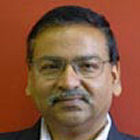
Saleemul Huq: Climate change scientists made enormous contribution
Saleemul Huq
Saleemul Huq, senior fellow in the Climate Change Group at the International Institute for Environment and Development in the United Kingdom, was the lead author of the chapter on adaptation and sustainable development in the Third Assessment Report of the Intergovernmental Panel on Climate Change (IPCC), and lead author of the chapter on adaptation and mitigation in the IPCC’s most recent assessment report.
Science has played an extremely important role because of the issue of the impact of climate change on the potential fulfilment of MDGs. Starting from the IPPC Third Assessment Report which came out in 2001, and highlighted the fact that climate change will inevitably occur and there will be effects on poor countries and poor people. And scientists said that development aspirations, particularly those of the MDGs, would be adversely affected by the effects of climate change.
For the mitigation side of the equation [trying to reduce climate change] the science has largely been done in developed countries. The role of developing countries has been to absorb, accept and disseminate.
But when it comes to adaptation science, I think there has been a reversal of roles. Developing countries are at the forefront, not just of hard technologies but of [having the right] institutions, dealing with the problems and building adaptive capacities — the softer, societal knowledge of adaptation.
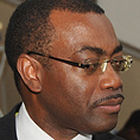
Akin Adesina: lots of breakthroughs but they need to reach the farmers
Flickr/agrforum
Akin Adesina, vice president of the Alliance for a Green Revolution in Africa, was appointed in June by UN secretary-general Ban Ki-moon to the MDG Advocacy Group, which aims to mobilise people towards meeting the MDGs.
We know that malnutrition is a big problem. And, in trying to deal with that, it’s not just raising productivity for food security that is important — you also have to have nutritional security. And one of the ways in which science is helping to do this is through the development of biofortification [breeding crops to increase their nutritional value]. We have the development right now in Africa of orange flesh sweet potato which is rich in beta-carotene and therefore important for nutrition.
We have global development of golden rice [genetically modified rice rich in beta-carotene]. We have developed, through science, new high-yielding varieties of rice that are tolerant to severe drought (in Africa) and severe flood (in Asia).
Science is also helping us to advance the whole issue around storage. Africa, for example, loses anything between 45 and 55 per cent of what it produces between the farmer and the consumer. And a lot is being done using science for biological control of pest populations right now in Africa.
More than anything else we have to take it to the farmers. There’s no point developing new technologies that are not in the hands of farmers.
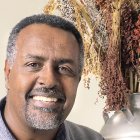
Gebisa Ejeta: MDGs forced leaders to notice science
Flickr/ILRI
Gebisa Ejeta, distinguished professor of Plant Breeding and Genetics and International Agriculture at Purdue University’s department of agronomy, and 2009 World Food Prize laureate, was part of the team that launched the Alliance for a Green Revolution in Africa.
African society has not been thoroughly exposed to the contributions of science. The culture has not been developed and African farmers, African communities have not turned towards science for solutions to their problems.
But the MDGs made targets associated with health, child mortality, education, agriculture and so on — and some of the contributions to these goals have come as a result of science.
For the first time — in a very long time — African leaders have begun to invest in science and are using science as a vehicle for development.
And so I really think that the MDGs have provided a mechanism by which leaders have begun to pay attention to the values of science as a solution for a number of problems on the continent.
If we really are serious about making these MDGs sustainable, the results can only stay there if the competence level of society is high enough to retain them.
Once you build that competence the local society will be ready to engage in its own education, its own research and technology transfer, so that reliance on outside help is minimised.
And this has really started to happen in Africa in the last seven years or so: investments have increased in agricultural research, there is a proliferation of educational programmes across the continent (I worry about the quality of those institutions because they are coming in a large number and the faculty capacity has not been strengthened). It’s a much more positive change than I have seen in a long, long time in Africa.
I absolutely agree that science is not enough. But, at the end of the day, it is only the technologies that come through science that are transformative of the lives of people at a lower level. But in order to get there you will need the commitment and the leadership of politicians.
It is unlikely that outside agencies can convince the internal political leaders. That will have to be initiated from within. When you begin to see demand coming from the communities it is likely to stick.
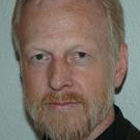
Arne Tostensen: missed opportunities demand better implementation
Courtesy of Chr. Michelsen Institute
Arne Tostensen, senior researcher and a former director at the Chr. Michelsen Institute, in Norway, recently co-authored a report ‘Science and technology for development: the institutional landscape in Africa and Europe’, with I. N. Barugahara, from the Uganda National Council for Science, for the Network for the Coordination and Advancement of Sub-Saharan Africa-EU Science & Technology Cooperation (CAAST–Net).
Science has the potential to contribute to the MDGs but the route from that insight, and from scientific knowledge, into policy and action is important and other types of knowledge are essential, so it is very difficult to attribute the success of the MDGs to science. There is no one-to-one link between science and the achievement of MDGs as I see it, I think it’s a very complex relationship.
Of course I believe that technology is important in guiding strategies for the achievement of the MDGs but sometimes politicians act for entrenched, vested interests and they overlook or dismiss scientific insights.
Knowledge is available but it is up to practitioners and politicians to actually apply that knowledge and that is a bigger hurdle.
One solution is to establish fora for dialogue between scientists, practitioners, policymakers and decision-makers at the grassroots. This would be demanding but there is no other way.
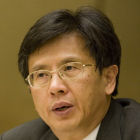
Viroy Tangcharoensathien: science responds to money, not need
WHO
Viroj Tangcharoensathien is director of the International Health Policy Program, Thailand, a country that achieved all the MDGs by the early 2000s and has since been working on more ambitious, ‘MDG Plus goals’.
New science was not really crucial for Thailand to achieve the MDGs. Making existing science and technology accessible to the poor has been more than enough. Only MDG 6, on HIV/AIDS and tuberculosis, has been in need of new science — new chemicals that are less harmful while at the same time more effective against the diseases.
Existing science and technology have done a lot for the MDGs. For example we can use cell phones for disseminating information to remote areas.
But science and technology without good governance can be harmful. For example for-profit sectors just use the internet to boost their market and can make consumers overpay for their product.
Another innovation that has been beneficial to developing countries is diagnostics in medicine. But access to medical innovations is a problem because rich countries, like the United States, practise evergreening [extending the patents on old technologies], which causes a huge gap in access. Also, rich countries tend not to invest in neglected tropical diseases research because there is no market there.
So science and technology have not been responsive to the health needs of poor countries — they have been very much responsive to money.
Ricardo Uauy: the useful science was already there
Neal Macinnes
Ricardo Uauy, professor of Public Health Nutrition at the London School of Hygiene and Tropical Medicine and former director of Chile’s Institute of Nutrition and Food Technology, is an expert on international nutrition.
Science has had a very important role to play: in defining the nature of the problem; finding the best solutions and looking at the broad impact of the solutions — many times there are unintended consequences. Also science has played a role in evaluating the best, cost-effective ways of doing things.
Of course lots of the science needed to meet the MDGs is already there. You always need new science to make it better but lack of knowledge is not the impediment to action.
Building research capacity in developing countries is vital because many solutions are context-specific and the recipes shouldn’t come from the outside. Also traditional knowledge can play a role: folded over traditional saris can, for example, be better at filtering water than plastic filters.
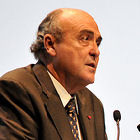
Carlos Perez de Castillo: millions of children are better fed because of agricultural research
GCARD/Lubna Cole
Carlos Perez de Castillo, chair of the consortium board of the Consultative Group on International Agricultural Research (CGIAR), a group of donors that spends over US$540 million a year on agricultural research.
According to an independent review of the CGIAR in 2008, public investment in international agricultural research through CGIAR has resulted in: an increase in world food production of 4–5 per cent; 7–8 per cent more food produced in developing countries; world food and grain prices that are 18–21 per cent lower than they would otherwise have been and better nutrition for 13–15 million children.
Agricultural growth is critical to achieving the MDGs as the vast majority of potential beneficiaries depend on agriculture for their livelihoods. We are in the process of setting new research priorities and enhancing our partnership approach to agricultural research for development. We have identified 15 priority research areas and we are designing programmes around these.
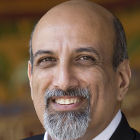
Salim Karim: stakeholder discussion groups are essential to get science applied
Courtesy of South Africa University of KwaZulu-Natal
Salim Karim, director of the Centre for the AIDS Programme of Research in South Africa, spent his life building research capacity in South Africa and is a leading expert on aspects of HIV/AIDS prevention and treatment.
If you look at the strides we have made in reducing childbirth mortality among women due to pre-eclampsia … with the single discovery that magnesium sulphate given immediately after birth drastically reduces mortality … that is just one example of the power of science to help achieve the MDGs.
Now the challenge is to make sure everyone follows it and that it is implemented in every clinic.
Science is contributing to helping developing nations decide the best things they can do and, all the time, it’s helping us move closer to our MDGs.
I think the system could do with substantially more interaction [among the different stakeholders]. It’s not only that the scientists need to interact with the policymakers and the implementers, it’s the other way round. We have different languages.
In South Africa, in the area of HIV, we have the National Aids Council, which is an opportunity for scientists, civil society, implementers, policymakers, legal people, all kinds of stakeholders to have a seat at a table and work together on how we are going to meet the challenges.
I’ve been very heartened to see how that dialogue is achieving success, certainly in HIV in South Africa.
You’ve heard the experts, now have your say on science and the Millennium Development Goals:

